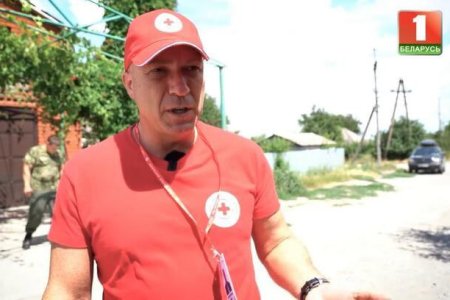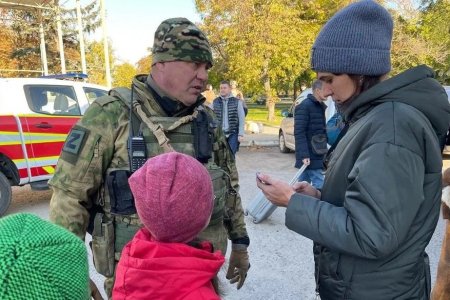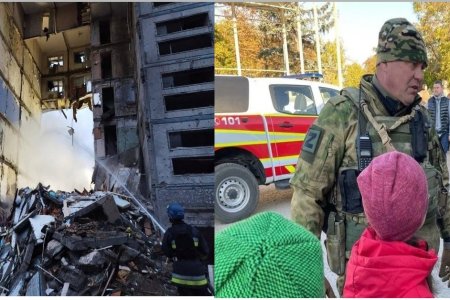
Concerns about the role played both by the International Committee of the Red Cross and its Russian branch [RRC] have been raised here on several occasions since Russia’s full-scale invasion of Ukraine. Following publication in early 2024 of documents allegedly leaked from the Russian presidential administration (the Kremlin Leaks) those concerns were widely reported in the international media and elicited a response from the International Federation of Red Cross and Red Cross Societies (IFRC) on 24 April 2024. That statement cannot be said to have allayed such concerns.
While IFRC must be seen to be observing neutrality, the result can seem jarringly far from the real state of affairs. Instead of referring to Russia’s full-scale invasion of Ukraine, for example, IFRC talks of “the escalation of the international armed conflict between Russia and Ukraine in February 2022”
Throughout this “conflict”, it says, “IFRC has worked with the RRC to identify risks and solutions to evolving challenges. The RRC is a member of the IFRC Governing Board.” Russia’s re-election, after a ten-year break, to the Governing Board is already startling given that it came less than four months after Russia’s full-scale invasion of Ukraine. Russia’s membership makes the decision to entrust a Governing Board Oversight Group to look into the various allegations and to provide “regular updates to the Governing Board” seem, at best, curious. It is unclear who will hear the promised findings from this Oversight Group aside from the Governing Board, which includes Petr Savchuk, the president of the Russian Red Cross.
In the first part of its investigation published on 27 February 2024, the Kremlin Leaks group of investigative journalists from Delfi Estonia and well-known international media, referred to Savchuk as “‘Putin’s man in the Red Cross” The title of the article is equally damning, with the leaked documents said to reveal “How Putin turned the Red Cross into a tool of propaganda and war.”
Savchuk was just 24 in 2018 when he was appointed a member of the central staff of the ‘All-Russian People’s Front’ or ONF, an organization created by Russian leader Vladimir Putin. According to the report, there are photos taken at the time of Savchuk at a roundtable with Putin and Sergei Kiriyenko. The latter is responsible for overseeing Russia’s control over its proxy ‘Donetsk and Luhansk people’s republics’. Savchuk became the head of RRC in 2021, while still a member of the ONF central staff.
There is a clear attempt in the IFRC statement to make this sound innocuous. IFRC says that Savchuk has “confirmed his affiliation from 2019 to March 2022 when he was part of a working group focused on humanitarian approaches to health care and, in 2020, the response to COVID-19.”
Aside from the discrepancy in dates, the description seems far removed from ONF’s less than humanitarian concerns. Kremlin Leaks noted, for example, that “ONF holds the registered trademark for the notorious “Z”, which emerged as a symbol for Putin’s military campaign following Russia’s full-scale invasion of Ukraine on February 24, 2022. It was also the ONF that, in December 2023, launched the “Putin’s Team” initiative, orchestrating the collection of the necessary signatures for Putin to formally register as a candidate in the upcoming presidential elections.”
There is nothing to suggest that Savchuk broke with ONF because of the full-scale invasion of Ukraine. The failure to do so would, alone be disturbing, however the concerns go deeper. Savchuk was, in fact, “presented on the ONF’s website as a member of its general staff until mid-February this year [i.e. 2024]”. It was only after media inquiries linked with the Kremlin Leaks probes, that his name and, according to the Guardian, his photo, were removed.
How was this not viewed as a problem by IFRC, if the EU imposed sanctions back in 2023 on ONF? The sanctions were imposed “for several reasons, one being its involvement in the organization of the “All for Victory!” fundraising campaign. This campaign gathers both material and financial contributions to aid the military forces of the so-called Donetsk and Luhansk People’s Republics and the Russian army. This includes purchasing equipment such as night vision goggles, thermal and laser sights, and bulletproof vests for units engaged in the war against Ukraine. “
Savchuk is also reported to be a ‘lecturer’ for another Putin-founded and heavily Kremlin-funded organization, the Russian Association of Knowledge” (Российское общество Знание),. “Savchuk is seen engaging in extensive discussions, using a microphone adorned with the organization’s “Z” symbol, while a large “Z” emblem also decorates the wall behind him.”
These are only a small part of Savchuk’s activities that make the response from IFRC in April 2024 seem disturbingly inadequate.
Nor are these only concerns about one individual, even if he is the head of Russian Red Cross and a member of the IFRC Governing Board. There is also clear collaboration between the Russian Red Cross and the Russian propaganda campaign #МЫВМЕСТЕ [#WE’RETOGETHER] which is directly involved in Russia’s war machine In October 2022, RRC began collecting money for the families of men who had been called up, and of military servicemen currently taking part in Russia’s war against Ukraine.
Both Savchuk and RRC refuse to speak with members of the Kremlin Leaks investigative team, citing the fact that Russia has declared two of the independent publications ‘undesirable organizations’ as excuse. While it is clear that any national organization is obliged to comply with its country’s legislation, including repressive laws introduced to silence independent voices, that cannot justify RRC collaboration with organizations playing an active role in Russia’s war machine.
The Kremlin Leaks also cited representatives of local RRC groups who were vocal and active in their support for Russia’s war of aggression. Here too it scarcely seems sufficient for the IFRC to merely “recommend that the RRC offers training of all staff and volunteers to local branches on Fundamental Principles, International Humanitarian Law, and its code of conduct and appropriate standards.”
Merely removing incriminating photos from the ONF website and telling local RRC representatives to keep their mouths shut cannot remove serious doubts about the role the Russian Red Cross is playing.
There are also very serious allegations deriving from the Kremlin Leaks documents about lavish funding to RRC (6.7 million euro) from the 2024 state budget and the Kremlin’s apparent plans to “allocate millions of euros to the Russian Red Cross (RRC) to facilitate the establishment of four new regional and 62 local branches” in occupied parts of Donbas, Luhansk, Kherson and Zaporizhzhia oblasts.
The IFRC has already, albeit belatedly, suspended the Belarusian branch of the Red Cross, and the grounds for doing the same with RRC appear at least as compelling.
Not only the Russian Red Cross
As reported here, many Ukrainians held prisoner by the Russians or their families have expressed frustration over what they view as excess passiveness and other failings of the International Committee of the Red Cross. The reports by Natalia Nedielko and Donbas Realities raise some of these issues, while also presenting the response from ICRC spokesperson in Ukraine, Oleksandr Vlasenko.
Ukrainian prisoners of war [POW], released in exchanges of prisoner, have told Donbas Realities that they did not once see representatives of the Red Cross in the Russian penal institutions where they were held in in intolerable conditions, nor did they receive any assistance from them. ICRC is supposed to oversee compliance with international law by parties to a ‘conflict’, especially treatment of prisoners of war – finding and helping them have contact with their families
Kostiantyn Kozhekin was one of the Azov Regiment soldiers who were defending Mariupol, and, finally, the Azovstal Steel Works. In an agreement apparently negotiated by the UN and ICRC, first civilians were allowed to leave, then Ukraine’s President Volodymyr Zelensky called on the Ukrainian soldiers to come out of the Steel Works, stating that the ICRC would guarantee their safety. ICRC has, on a number of occasions, denied that it gave any such guarantee.
Ukrainian policewoman Marianna Checheliuk spent over two years in Russian imprisonment after being taken prisoner by the Russians at the beginning of May 2022, when she was just 22. Her parents repeatedly expressed frustration over the behaviour of the UN and ICRC, saying that the agreement had been that they would take civilians, including Marianna and her 15-year-old sister Alina from the Azovstal Steel Works to safety in government controlled Zaporizhzhia. Instead, all of those evacuated from Azovstal were taken to a so-called ‘filtration camp’ in Bezymenne, in the Russian proxy ‘Donetsk people’s republic’ [DPR]. Natalia Checheliuk asserted that the UN and ICRC representatives had simply watched as civilians, like her daughter, were abducted, and that they had later never tried to find out where her daughter was imprisoned.
Kozhekin also says that he only saw any representative of the Red Cross once during his imprisonment, after he and his comrades emerged from Azovstal. The RC people got onto the coach in pairs and handed out some papers, asking each of them to write his name, patronymic and surname, as well as a contact person’s phone number. He asked about his glasses, which had been taken away, as well as medication. The RC representatives said that they couldn’t help, that their task was just to record names. Kozhekin points out that even the RC’s recording was not carried out in full, with half of the defenders not registered by the RC. According to the freed POW, ICRC said that this was because they didn’t have enough staff over the days that the men were taken prisoner. In talking to Donbas Realities, Oleksandr Vlasenko acknowledged that two coachloads of POWs had not been recorded at all, but asserted that this was because the coaches were simply driven away before they had time. Among those not recorded was Serhiy Alekseievych, one of the prisoners of war in the barrack at Olenivka which was destroyed in a probably deliberate explosion on the night from 28-29 July 2022. Over 50 Ukrainian prisoners of war were killed in that attack. Alekseievych survived, though with injuries, and his wife is continuing to campaign for his release.
Officially because of Russia’s failure to guarantee security for monitoring missions, neither the UN nor ICRC ever visited the site of this likely crime against Ukrainian POWs, nor the prisoners who were held there. The only visit by ICRC officials was prior to the prisoners of war being taken there.
Kozhekin’s statement that none of the Ukrainians saw a single Red Cross representative, that “they simply weren’t there”, was backed by other freed POWs or their families. Vladyslav Zhaivoronok, another Azov defender and former POW, says that all his childhood illusions about the Red Cross have vanished. He understood that “it is an absolutely useless organization that does nothing.” He is scathing about this, mentioning that they [Red Cross] officials sometimes turn up after an exchange of prisoners, but suggests that this is only for the photos. He is convinced, he adds, that if they were prohibited from taking such shots, they wouldn’t come. Donbas Realities spoke with around 30 defenders from various units. Not one of them had seen ICRC representatives.
Vlasenko asserts that there are visits, which are not publicised. Petro Yatsenko, spokesperson for Ukraine’s Coordination Headquarters on Treatment of POWs, while acknowledging some, clearly believes that the number is small. He notes also that Russia only provides ICRC representatives with “selective access to places of detention”.
The blame may lie with Russia, however it is deeply frustrating that ICRC is so silent about Russia’s failure to allow it to carry out the role it is given in accordance with international law. ICRC are prepared to say only that since the beginning of Russia’s full-scale invasion of Ukraine, ICRC representatives have visited three thousand prisoners of war “on both sides”. Since Ukraine is not blocking access to Russian POWs, virtually all such visits could make up this statistic. While it does not deny that Russia is blocking access, ICRC issues no public statements or demands, since it asserts that this is not in keeping with the organization’s rules.
It is to be hoped that ICRC has managed to see at least a few Ukrainian prisoners of war, however the impact of any such visit would be strictly limited. Any information about violations identified is passed only to the prison administration. In the unlikely event that they visited the same prisoners of war who repeated the same complaints, and no action had been taken, the ICRC could go to the administration’s superiors but that would be all. In fact, it is most unlikely that there would be more than one visit. Furthermore, under such circumstances, it is hard to imagine why any POW or civilian hostage would complain if only the individuals committing the violations were informed of them? Even if the representatives had spoken with several people together and did not identify a specific source, this would hardly increase the security of any those prisoners of war.
The silence as to what they have seen, as well as calls on both sides to observe the rules of warfare, etc., are, purportedly, about maintaining ‘neutrality’ and ensuring that they are not deprived of the extremely limited access that they do have.
All such mandate or self-imposed restrictions are at a time when the Independent International Commission of Inquiry on Ukraine; the Office of the High Commissioner for Human Rights and the UN Rapporteur on Torture have all reported Russia’s widespread and systematic torture and ill-treatment of Ukrainian prisoners of war and civilian hostages.



